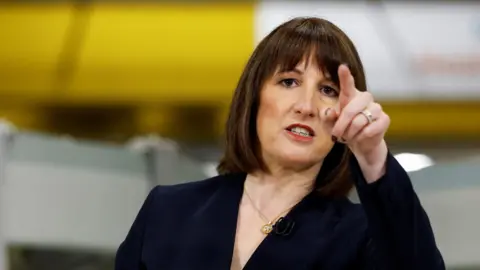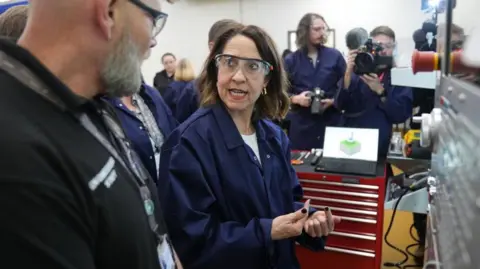Welfare reform is next, but Labour ministers are treading carefully
Henry ZeffmanBBC chief political correspondent•@hzeffman PA Media
PA Media
When Sir Keir Starmer was preparing to run for the Labour leadership in 2020, his campaign director told the future prime minister what mattered to the party.
Morgan McSweeney emphasised that whatever their faction, Labour members shared certain core principles – and top of the list was a commitment to combatting poverty and defending the welfare state.
That is why any Labour politician treads carefully when looking at welfare reform.
This government, though, is not just looking at reforming welfare – it is preparing to put it at the heart of its economic agenda.
In Rachel Reeves’s big speech on growth this week, she vowed that to achieve “fundamental” reform of the welfare system, the government would look at areas that have been “ducked for too long, like the rising cost of health and disability benefits”.
What did that mean?
The question is being frantically addressed between the Treasury and the Department of Work of Pensions (DWP) right now.
Liz Kendall, the work and pensions secretary, will present a “green paper” – or policy proposals – on welfare reform in just over a month, designed to demonstrate how serious the government is about finding ways to get more people into work – and save money from the welfare budget.
That dual motive explains why this is being treated as such an urgent issue at the top of government.
Ministers are concerned by a situation in which the amount of people who are in receipt of certain benefits has surged. Meanwhile, the Treasury needs to ensure that it is not on course to break its own self-imposed fiscal rules.
“It’s high up the agenda for us because of the cost implications but also the broader economic problem of having so many people economically inactive,” a Treasury source said.
And in 10 Downing Street, aides say that tackling this issue would be the clearest sign yet that Sir Keir is truly serious about reforming public services.
Last year, the government spent £65bn on sickness benefits – a 25% increase from the year before the pandemic. That figure is forecast to increase to around £100bn before the next general election.
Some of this is the legacy of Covid. But the chancellor has made clear her view that another reason for this surge is the “perverse incentives” wired into the system.
Again and again, ministers and officials complain of a system where those on universal credit are required to display evidence they have applied for jobs, or face sanctions – but people out of work who also qualify for sickness benefits both get more money and are not necessarily required to seek work.
Ministers believe that this encourages some people to “game the system”. Some Labour advisers fear this issue is being exacerbated, especially among young people, by videos on TikTok and other platforms which explain to claimants the best ways to fill out questionnaires in order to get sickness benefits.
One option officials are examining is whether there should be – as in the past – a third path whereby some people on sickness benefits are required to seek work – but without the risk that they lose their sickness benefits.
“Lots of people tell us they’re scared to go to work in case it doesn’t work out and they then can’t go back to the safety net,” a senior government source said.
Some in government say this may need more frequent assessments of claimants’ health, but those involved in discussions acknowledge that being required to explain their condition to the DWP can often be “traumatic”, “humiliating” and “terrifying” for vulnerable claimants.
Better training and coaching can help, but the amount of money involved may not sit well with a Treasury that’s in savings mode.
That’s complicated enough – and that’s before you even get to the finances and the politics.
On the finances, this round of welfare reform is designed to generate savings that can be “scored”, in other words accounted for, by the Office for Budget Responsibility (OBR) at the next Budget in the autumn.
But those involved in past Budgets caution that it is “basically impossible” to persuade the OBR that the savings will actually happen.
And then there’s the politics.
As McSweeney, now Sir Keir’s chief of staff, found – the Labour Party is deeply committed to the welfare state and deeply anxious about anything which looks like the safety net is fraying.
That’s not just true of party members but MPs too. Among the vast 2024 intake of Labour MPs, one of their most common reasons for getting involved in the Labour Party was opposition to Conservative austerity and welfare cuts.
That means that even some of those most loyal to Starmer and Reeves are privately expressing significant anxiety about the direction of travel.
Some of these tensions are beginning to spill into public view.
At PMQs this week Debbie Abrahams, the Labour chair of the work and pensions select committee, said that “speculation” about billions of pounds of savings to be found from the social security budget had left “many vulnerable claimants [feeling] worried”.
She warned the prime minister that “language matters”.
 Getty Images
Getty Images
Work and Pensions Secretary Liz Kendall will be presenting a green paper on welfare reform in about a month’s time
Senior Labour figures involved in the discussions are adamant that it is Reeves and Starmer who are in line with public opinion, not concerned Labour MPs.
One complained: “If you ask Labour MPs whether they’d rather be on the side of the public or on the side of a lot of the Labour movement and vocal disability campaigners – well, for some of them that’s a marginal call.”
Others caution about public opinion on this issue though: “The public think they support welfare cuts until they hear a story about someone they feel sympathy for losing money. Then they don’t.”
Some older hands warn of how quickly the government could be left out of step with its base, pointing to the party’s decision to abstain on a Conservative welfare bill in July 2015.
Such was the scale of Labour members’ fury that Conservative welfare cuts were not being opposed, it is seen by many as the main reason that Jeremy Corbyn’s longshot leadership campaign took off.
Jon Ashworth, a former shadow cabinet minister who is still close to top party figures, urged the government to put “helping people move into good, well-paid jobs” at the heart of their arguments for reform.
He said: “The welfare system as currently designed traps people out of work and actively denies people who want to work real, genuine help.”
These political considerations are not new territory for Reeves. She was shadow work and pensions secretary for two years before the 2015 general election.
Her vow that Labour would be “tougher than the Tories on benefits” made her deeply controversial with the party’s grassroots for years afterwards. Speaking to the New Statesman in 2021, Reeves acknowledged she may have made her point “badly”, but insisted that “spending more on benefits wasn’t always a sign of success. And actually the benefits bill goes up when society fails.”
These dilemmas may not be new for Reeves, but they have left some of her colleagues feeling uneasy at best.
“Of course I’m worried about the politics of this,” one minister said.
“Anyone with a brain would worry about this.”
#Welfare #reform #Labour #ministers #treading #carefully


